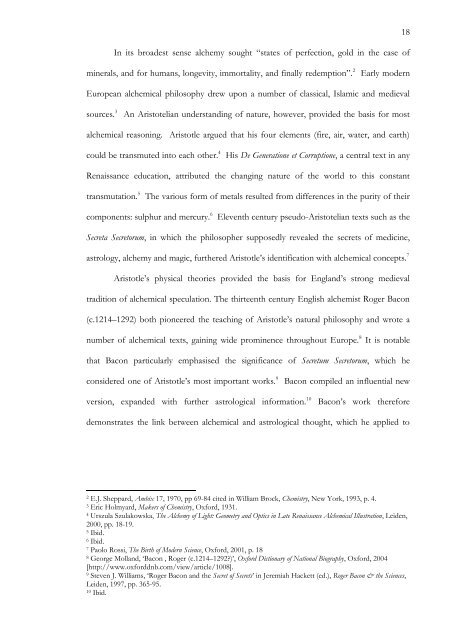The Alchemical Patronage of Sir William Cecil, Lord Burghley
The Alchemical Patronage of Sir William Cecil, Lord Burghley
The Alchemical Patronage of Sir William Cecil, Lord Burghley
You also want an ePaper? Increase the reach of your titles
YUMPU automatically turns print PDFs into web optimized ePapers that Google loves.
In its broadest sense alchemy sought ―states <strong>of</strong> perfection, gold in the case <strong>of</strong><br />
minerals, and for humans, longevity, immortality, and finally redemption‖. 2 Early modern<br />
European alchemical philosophy drew upon a number <strong>of</strong> classical, Islamic and medieval<br />
sources. 3 An Aristotelian understanding <strong>of</strong> nature, however, provided the basis for most<br />
alchemical reasoning. Aristotle argued that his four elements (fire, air, water, and earth)<br />
could be transmuted into each other. 4 His De Generatione et Corruptione, a central text in any<br />
Renaissance education, attributed the changing nature <strong>of</strong> the world to this constant<br />
transmutation. 5 <strong>The</strong> various form <strong>of</strong> metals resulted from differences in the purity <strong>of</strong> their<br />
components: sulphur and mercury. 6 Eleventh century pseudo-Aristotelian texts such as the<br />
Secreta Secretorum, in which the philosopher supposedly revealed the secrets <strong>of</strong> medicine,<br />
astrology, alchemy and magic, furthered Aristotle‘s identification with alchemical concepts. 7<br />
Aristotle‘s physical theories provided the basis for England‘s strong medieval<br />
tradition <strong>of</strong> alchemical speculation. <strong>The</strong> thirteenth century English alchemist Roger Bacon<br />
(c.1214–1292) both pioneered the teaching <strong>of</strong> Aristotle‘s natural philosophy and wrote a<br />
number <strong>of</strong> alchemical texts, gaining wide prominence throughout Europe. 8 It is notable<br />
that Bacon particularly emphasised the significance <strong>of</strong> Secretum Secretorum, which he<br />
considered one <strong>of</strong> Aristotle‘s most important works. 9 Bacon compiled an influential new<br />
version, expanded with further astrological information. 10 Bacon‘s work therefore<br />
demonstrates the link between alchemical and astrological thought, which he applied to<br />
2 E.J. Sheppard, Ambix 17, 1970, pp 69-84 cited in <strong>William</strong> Brock, Chemistry, New York, 1993, p. 4.<br />
3 Eric Holmyard, Makers <strong>of</strong> Chemistry, Oxford, 1931.<br />
4 Urszula Szulakowska, <strong>The</strong> Alchemy <strong>of</strong> Light: Geometry and Optics in Late Renaissance <strong>Alchemical</strong> Illustration, Leiden,<br />
2000, pp. 18-19.<br />
5 Ibid.<br />
6 Ibid.<br />
7 Paolo Rossi, <strong>The</strong> Birth <strong>of</strong> Modern Science, Oxford, 2001, p. 18<br />
8 George Molland, ‗Bacon , Roger (c.1214–1292?)‘, Oxford Dictionary <strong>of</strong> National Biography, Oxford, 2004<br />
[http://www.oxforddnb.com/view/article/1008].<br />
9 Steven J. <strong>William</strong>s, ‗Roger Bacon and the Secret <strong>of</strong> Secrets‘ in Jeremiah Hackett (ed.), Roger Bacon & the Sciences,<br />
Leiden, 1997, pp. 365-95.<br />
10 Ibid.<br />
18















